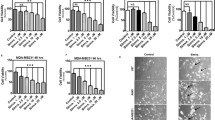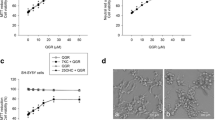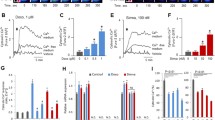Abstract
Mevastatin which is an inhibitor of 3-hydroxy-3-methylglutaryl-coenzyme A (HMG-CoA) reductase, the rate-limiting enzyme in cholesterol synthesis, suppress cell proliferation and induce apoptosis. However, the molecular mechanism of apoptosis induction is not well understood. So, in the present study, we attempted to clarify the mechanism by which mevastatin induces apoptosis in HL60 cells. It was found that mevastatin induced apoptosis. At that time, we observed an increase in caspase-3 activity and morphological fragmentation of the nuclei. The apoptosis induced by mevastatin was not inhibited by the addition of farnesyl pyrophosphate (FPP), squalene, ubiquinone, and isopentenyladenine, but was inhibited by the addition of geranylgeranyl pyrophosphate (GGPP). When we examined the survival signals at the time of apoptotic induction, we also observed that the administration of mevastatin had caused a remarkable decrease in the phosphorylation of extracellular signal-regulated kinase 1/2 (ERK1/2). However, other survival signals, such as nuclear factor kappa B (NF-κB), protein kinase B (Akt), and p38 mitogen-activated protein kinase (p38), exhibited no change. In addition, no quantitative change was observed in Bcl-2, which was an anti-apoptosis protein. It was also observed that apoptosis was induced when U0126, an MEK inhibitor, was added to the cells to inhibit ERK. These results suggested that mevastatin induced apoptosis when it inhibited GGPP biosynthesis and consequently decreased the level of phosphorylated ERK, which was a survival signal; moreover, at that time, there was no influence on NF-κB, Akt, p38, and Bcl-2. The results of this study also suggested that mevastatin could be used as an anticancer agent. (Mol Cell Biochem 269: 109–114, 2005)
Similar content being viewed by others
References
Shepherd J, Cobbe SM, Ford I, Isles CG, Lorimer AR, MacFarlane PW, McKillop JH, Packard CJ: Prevention of coronary heart disease with pravastatin in men with hypercholesterolemia. West of Scotland Coronary Prevention Study Group. N Engl J Med 333: 1301–1307, 1995
Sacks FM, Pfeffer MA, Moye LA, Rouleau JL, Rutherford JD, Cole TG, Brown L, Warnica JW, Arnold JM, Wun CC, Davis BR, Braunwald E: The effect of pravastatin on coronary events after myocardial infarction in patients with average cholesterol levels. Cholesterol and Recurrent Events Trial Investigators. N Engl J Med 335: 1001–1009, 1996
Reedquist KA, Pope TK, Roess DA: Lovastatin inhibits proliferation and differentiation and causes apoptosis in lipopolysaccharide-stimulated murine B cells. Biochem Biophys Res Commun 211: 665–670, 1995
Miquel K, Pradines A, Favre G: Farnesol and geranylgeraniol induce actin cytoskeleton disorganization and apoptosis in A549 lung adenocarcinoma cells. Biochem Biophys Res Commun 225: 869–876, 1996
Dimitroulakos J, Nohynek D, Backway KL, Hedley DW, Yeger H, Freedman MH, Minden MD, Penn LZ: Increased sensitivity of acute myeloid leukemias to lovastatin-induced apoptosis: A potential therapeutic approach. Blood 93: 1308–1318, 1999
Dimitroulakos J, Ye LY, Benzaquen M, Moore MJ, Kamel-Reid S, Freedman MH, Yeger H, Penn LZ: Differential sensitivity of various pediatric cancers and squamous cell carcinomas to lovastatin-induced apoptosis: Therapeutic implications. Clin Cancer Res 7: 158–167, 2001
Grunler J, Ericsson J, Dallner G: Branch-point reactions in the biosynthesis of cholesterol, dolichol, ubiquinone and prenylated proteins. Biochim Biophys Acta 1212: 259–277, 1994
Jackson SM, Ericsson J, Edwards PA: Signaling molecules derived from the cholesterol biosynthetic pathway. Subcell Biochem 28: 1–21, 1997
Dimitroulakos J, Thai S, Wasfy GH, Hedley DW, Minden MD, Penn LZ: Lovastatin induces a pronounced differentiation response in acute myeloid leukemias. LeukLymphoma 40: 167–178, 2000
Agarwal B, Bhendwal S, Halmos B, Moss SF, Ramey WG, Holt PR: Lovastatin augments apoptosis induced by chemotherapeutic agents in colon cancer cells. Clin Cancer Res 5: 2223–2229, 1999
Keyomarsi K, Sandoval L, Band V, Pardee AB: Synchronization of tumor and normal cells from G1 to multiple cell cycles by lovastatin. Cancer Res 51: 3602–3609, 1991
Jakobisiak M, Bruno S, Skierski JS, Darzynkiewicz Z: Cell cycle-specific effects of lovastatin. Proc Natl Acad Sci USA 88: 3628–3632, 1991
Russell DW, Setchell KD: Bile acid biosynthesis. Biochemistry 31: 4737–4749, 1992
Olson RE, Rudney H: Biosynthesis of ubiquinone. Vitam Horm 40: 1–43, 1983
Stocker R, Bowry VW, Frei B: Ubiquinol-10 protects human low density lipoprotein more efficiently against lipid peroxidation tha does alpha-tocopherol. Proc Natl Acad Sci USA 88: 1646–1650, 1991
Goldstein JL, Brown MS: Regulation of the mevalonate pathway. Nature 343: 425–430, 1990
Xia Z, Tan MM, Wong WW, Dimitroulakos J, Minden MD, Penn LZ: Blocking protein geranylgeranylation is essential for lovastatin-induced apoptosis of human acute myeloid leukemia cells. Leukemia 15: 1398–1407, 2001
Raiteri M, Arnaboldi L, McGeady P, Gelb MH, Verri D, Tagliabue C, Quarato P, Ferraboschi P, Santaniello E, Paoletti R, Fumagalli R, Corsini A: Pharmacological control of the mevalonate pathway: Effect on arterial smooth muscle cell proliferation. J Pharmacol Exp Ther 281: 1144–1153, 1997
Wong WW, Tan MM, Xia Z, Dimitroulakos J, Minden MD, Penn LZ: Cerivastatin triggers tumor-specific apoptosis with higher efficacy than lovastatin. Clin Cancer Res 7: 2067–2075, 2001
Li HY, Appelbaum FR, Willman CL, Zager RA, Banker DE: Cholesterol-modulating agents kill acute myeloid leukemia cells and sensitize them to therapeutics by blocking adaptive cholesterol responses. Blood 101: 3628–3634, 2003
Hillyard DZ, Cameron AJ, McIntyre AH, Hadden MH, Marshall HE, Johnston N, Jardine AG: Inhibition of proliferation and signalling mechanisms in human lymphocytes by fluvastatin. Clin Exp Pharmacol Physiol 29: 673–678, 2002
Johnson MD, Woodard A, Okediji EJ, Toms SA, Allen GS: Lovastatin is a potent inhibitor of meningioma cell proliferation: Evidence for inhibition of a mitogen associated protein kinase. J Neurooncol 56: 133–142, 2002
Miyazaki T, Katagiri H, Kanegae Y, Takayanagi H, Sawada Y, Yamamoto A, Pando MP, Asano T, Verma IM, Oda H, Nakamura K, Tanaka S: Reciprocal role of ERK and NF-kappaB pathways in survival and activation of osteoclasts. J Cell Biol 148: 333–342, 2000
Weiss RH, Ramirez A, Joo A: Short-term pravastatin mediates growth inhibition and apoptosis, independently of Ras, via the signaling proteins p27Kip1 and P13 kinase. J Am Soc Nephrol 10: 1880–1890, 1999
Kanno T, Kobuchi H, Kajitani N, Utsumi T, Yano H, Horton AA, Yasuda T, Utsumi K: Mevastatin, an inhibitor of HMG-CoA reductase, induces apoptosis, differentiation and Rap1 expression in HL60 cells. Physiol Chem Phys Med NMR 34: 1–15, 2002
Ogata Y, Takahashi M, Takeuchi K, Ueno S, Mano H, Ookawara S, Kobayashi E, Ikeda U, Shimada K: Fluvastatin induces apoptosis in rat neonatal cardiac myocytes: A possible mechanism of statin-attenuated cardiac hypertrophy. J Cardiovasc Pharmacol 40: 907–915, 2002
Author information
Authors and Affiliations
Corresponding author
Rights and permissions
About this article
Cite this article
Nishida, S., Matsuoka, H., Tsubaki, M. et al. Mevastatin induces apoptosis in HL60 cells dependently on decrease in phosphorylated ERK. Mol Cell Biochem 269, 109–114 (2005). https://doi.org/10.1007/s11010-005-3086-0
Received:
Accepted:
Issue Date:
DOI: https://doi.org/10.1007/s11010-005-3086-0




